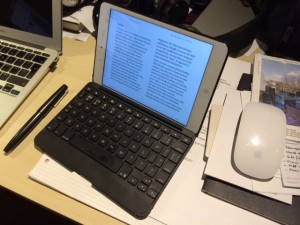This morning’s Observer column:
The old adage “if the service is free, then you are its product” needs updating. What it signified was that web services (like Facebook, Google, Yahoo et al) that do not charge users make their money by harvesting personal and behavioural data relating to those users and selling that data to advertisers. That’s still true, of course. But a more accurate version of the adage would now read something like this: if you use the web for anything (including paying for stuff) then you are also the product, because your data is being sold on to third parties without your knowledge.
In a way, you probably already knew this. A while back you searched for, say, a digital camera on the John Lewis site. And then you noticed that wherever you went on the web after that John Lewis ads for cameras kept appearing on the site you were visiting. What you were witnessing was the output of a multibillion-dollar industry that operates below the surface of the web. Think of it as the hidden wiring of our networked world. And what it does is track you wherever you go online…





